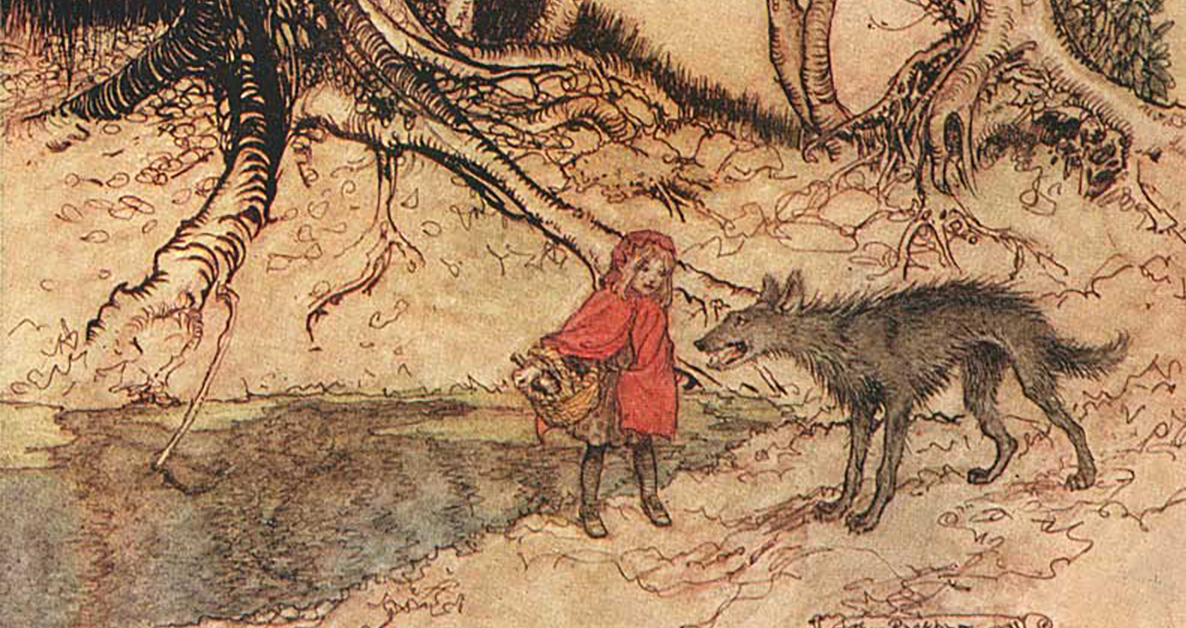It is a northern country; they have cold weather. The cold gets into their bones, their brains, their hearts.
Cold; tempest; wild beasts in the forest. It is a hard life. Their houses are built of logs, dark and smoky within; there will be a crude icon of the virgin behind a guttering candle, the leg of a pig hung up to cure, a string of drying mushrooms. A bed, a stool, a table. Nothing else.
The devil is a living presence to the upland woodsmen. He’s often been sighted in the graveyards, those bleak and touching townships of the dead where the graves are marked with portraits of the deceased in the naïf style and there are no flowers to place in front of them, no flowers grow there, so they put out little offerings, loaves, sometimes a cake that the bears come lumbering from the margins of the forest to snatch away.
Wreaths of garlic on the doors keep out of the vampires. A blue-eyed child born feet first on the night of St. John’s Eve will have second sight. When they discover a witch – some old woman whose cheeses ripen when her neighbours’ do not, another old woman whose black cat, oh, sinister! follows her about, they strip the crone, search her for marks, for the supernumerary nipple her familiar sucks. They soon find it. Then they stone her to death.
Winter the cold weather.
Go and visit grandmother, who has been sick. Take her the oatcakes I’ve baked on the hearthstone for her, and a little pot of butter.
The good child does as her mother bids. Five miles trudge through the forest; do not leave the path because of the bears, the wild boar, the starving wolves. Here, take your father’s hunting knife – you know how to use it.
The child had a coat of verminous sheepskin to keep out the cold. She knew the forest too well to fear it but she must always be on her guard. When she heard that freezing howl of a wolf, she grabbed hold of her knife, dropped her basket and turned on the beast.
It was huge, its eyes were red, its chops grizzled, any but a mountaineer’s child would have fainted from sheer terror at the sight of it but she did not. It went for her throat immediately, as wolves do, but she made a great swipe at it with her father’s knife and slashed off its right forepaw.
The wolf emitted a gulping, almost sob when it saw what had happened to it; wolves are cowards at heart. Then it went lolloping off disconsolately between the trees as well as it could on three legs, leaving a trail of blood behind it. The child wiped the blade of her knife clean on her apron, wrapped up the wolf’s paw in the cloth in which her mother had packed the oatcakes and went on towards her grandmother’s house. It soon came on to snow so thickly the path and any footsteps, tracks or spoor that might have been upon it were obscured.
She found her grandmother so sick she had taken her to bed, the covers pulled up her chin. The old woman had fallen into a fitful slumber, moaning and shaking so dreadfully the child guessed she had a fever. She felt her forehead, it burned. She shook out the cloth from her basket, to use it to make the old woman a cold compress, and the wolf’s paw fell to the floor.
But it was no longer a wolf’s paw. It was a hand, chopped off at the wrist, a hand gnarled with work and freckled with old age. There was a wedding ring on the third finger and a wart on the index finger. By the war, she knew it for her grandmother’s hand.
She pulled back the sheet but the old woman woke up, at that, and began to struggle, squawking and shrieking like a thing possessed. But the child was a strong child and held her down long enough to see the cause of the fever – there was a bloody stump where her right hand should have been, festering already, oozing pus.
The child crossed herself and cried out so loud the neighbours heard her and came rushing in. They knew the wart on her hand at once for a witch’s nipple, they drove the old woman, all in her shift as she was, out into the snow with sticks, beating her old carcase as far as the edge of the forest, and pelted her with stones until she fell down dead. The child cleaned up the mess in her grandmother’s cottage and lived there happily.
First published in the left weekly Socialist Challenge, 15 December, 1977; Angela Carter was a subscriber and supporter of the paper. Republished with kind permission of Mark Pearce and Alexander Pearce. A later draft of this tale appears in The Bloody Chamber and Other Stories (1979).
